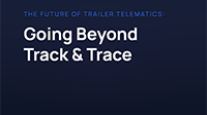iTECH: Technology Helps Fleets Develop New Business
This article appears in the April/May 2012 issue of iTECH, published in the April 9 print edition of Transport Topics. Click here to subscribe today.
As the U.S. economy continues to progress at a less-than-robust pace and motor carriers looking to improve their bottom line turn to the potentially risky tactic of diversifying their service offerings, experts, tech firms and carrier execs said one way to reduce the risk is to adapt the fleets’ existing technology to the new services.
Transportation management systems designed by technology companies to help with dispatching, invoicing and other aspects of a trucking business “can be integrated quite rapidly” to support new services, said Gary Salisbury, chairman of the Truckload Carriers Association, “because they have the ability to interface from one segment to another,” enabling diversification.
Mark Cubine, vice president of marketing for McLeod Software, Birmingham, Ala., said carriers can use some transportation-management systems to run multiple divisions on the same platform. That is useful, he said, because companies often will create legally separate companies for different operations to limit risk and liability. That feature also helps carriers to comply with accounting procedures that require them to document exceptions such as when a tractor assigned to the van freight company is used to pick up a refrigerated trailer belonging to a sister company, Cubine said.
Over the past 18 months, flatbed operator Maverick Transportation, North Little Rock, Ark., added refrigerated service and bulk-hauling business. The flatbed unit had been supported by the auto manufacturing and construction industries, said Wayne Brown, vice president of information technology, but both sectors fell into the doldrums for long stretches during the recession.
“We saw the need to diversify,” Brown said. “Having software in place that allows you to do that in an agile way is extremely important.”
Maverick Transportation — a subsidiary of Maverick USA, which ranks No. 96 on the Transport Topics Top 100 list of for-hire carriers in the United States and Canada — has more than 30 components in its IT setup, Brown said, adding that it uses features from systems originally provided by Innovative Computing and TNT (both now part of TMW Systems, Beachwood, Ohio); Manhattan Associates, Atlanta; and McLeod Software, Birmingham, Ala.
WebFocus, business-intelligence software supplied by Information Builders, New York, “blends all that software, all the disparate databases, together” for operational coherency, he said.
Maverick Transportation uses mobile-communication devices from Qualcomm Inc., San Diego. To support its foray into refrigerated service and bulk hauling, it plans to phase in a Qualcomm application called Circle of Service Workflow this year, which spells out the steps a driver is supposed to follow during delivery. The application can be customized according to a carrier’s needs as well as the varying demands of different shippers and their products, said Norm Ellis, vice president and general manager of transportation and logistics for Qualcomm Enterprise Services.
“Dedicated [service] is becoming a big part of the industry right now,” Maverick’s Brown said, adding that being able to support “committed capacity” can mean new business for a carrier.
He also said the carrier is “seeing big opportunities for dedicated [service] over the next couple of years.”
Maverick Transportation has 1,200 power units. Brown said that when it was just a flatbed operation, it had about the same number of trailers, but now its trailer supply includes 125 reefers, with more expected to be added, along with approximately 30 bulk trailers.
Brown also said that using numerous software elements in its IT setup is a common practice among carriers.
Cowan Systems, Baltimore, a dedicated contract truckload carrier that also offers intermodal and warehousing services, expanded into brokerage three or four years ago. The company, which ranks No. 83 on the TT for-hire list, has invested in powerful servers, each capable of running multiple operating systems, said David DeCillis, director of information technology, adding that it was a common practice for companies that require lots of computing power. He said the servers were useful when the company wanted to implement the brokerage module on its transportation management software that was provided by TMW. “It could be quickly implemented” — and modified to suit the carrier’s business processes, DeCillis said.
Much the same pattern has prevailed for the carrier’s growing intermodal operation, which includes drayage and working with owner-operators.
“They are our agents,” DeCillis said of the independent operators. “We provide the TMW software to all of these carriers.”
Cowan’s IT department includes nine people, including DeCillis, while its own fleet numbers about 750 tractors and almost 3,000 trailers, he said.
About transportation management systems in general, DeCillis said, “The expectation is that they will be modified because not everybody does business the same way.”
The changes may be made to pursue a competitive advantage or for the “comfort level” of the users, he said, adding, “We’ve done a tremendous amount of customization on it to fit the way we do business.”
Fleets that have proprietary systems usually can rely on in-house technology expertise to make enhancements to support new services, trucking managers said — though sometimes they, too, will purchase a license to use software and then create an interface for it.
Such was the case with truckload carrier Ozark Motor Lines, Memphis, Tenn., which has approximately 750 company-owned tractors and some 2,300 trailers, and has ventured into intermodal and brokerage services, said Tom McGoldrick, IT director.
The carrier supports those services with the transportation-management system it licensed years ago from Innovative Computing Corp., which was later acquired by TMW.
“We use pretty much their complete suite of applications,” McGoldrick said.
One exception was a brokerage component that Ozark licensed in the late 1990s. The sales manager at the time had wanted to look into establishing a brokerage, McGoldrick said, but the idea was abandoned.
“It just turned out to be something we weren’t suited to do operationally,” McGoldrick recalled.
But Ozark still had the license to use the software when it was ready to make another try, about five years ago.
“We had this package laying around collecting dust,” McGoldrick said. “We pulled the cover off it, made a couple of minor modifications” over the course of a month or so and implemented it.
The spur to go into intermodal was different. Burlington Northern Santa Fe undertook a massive intermodal railhead expansion” in Memphis, and Ozark Motor Lines’ owners and managers could see it from their office windows, McGoldrick said.
The carrier’s software suite did feature an intermodal module — features for payroll, operations, safety — “So we paid the relatively minor licensing fee and acquired it,” he said.
“We had to gin it up to use it the way we wanted, to better fit our operations,” McGoldrick said, in particular tailoring it to maintain and provide information showing that drivers meet qualifications to enter the rail yard. McGoldrick said such information is required by the railroad for security purposes.
CRST International, Cedar Rapids, Iowa, has a corporate IT group that serves a roster of different trucking businesses that it operates. These include van freight, logistics, flatbed, dedicated and refrigerated, which was added late in 2011.
For the refrigerated business, the IT group worked with the business side to choose temperature-monitoring technology that would provide alerts and location information about the trailers, said Steve Hannah, chief information officer for CRST. The company chose Thermo King to supply the refrigeration technology, as well as a monitoring system that provides the desired information via a Web portal, Hannah said. “It gave us the ability to manage the product in the trailer as it rolls across the country,” he said.
To make managing the refrigerated freight still easier, Hannah said, the IT group developed an interface to move load information from the Thermo King portal into the carrier’s freight-management system.
“It’s displayed as part of the load information that the manager is working with,” Hannah said. “We don’t want to have our people going to multiple screens, multiple solutions, to manage the load.”
CRST ranks No. 26 on the TT for-hire list.
Fikes Truck Line, Hope, Ark., which has been a flatbed operator for decades, also diversified last year into the refrigerated business. Salisbury, the TCA chairman, also is president and CEO of Fikes. He noted that unlike flatbed operations, in refrigerated operations, trailers often are “dropped” — left at a customer’s location to be unloaded at the customer’s convenience and picked up later by the driver. To keep track of dropped refrigerated trailers, the carrier had to rewrite some of its programming, something Fikes did with in-house IT talent, Salisbury said.
“We write our own programming. We have it built specifically to fit our needs. Fortunately, we have a couple of gentlemen who are very, very good,” he said.
Six months into the refrigerated business, Salisbury was asked how many trailers Fikes is running.
“I would rather not [answer that],” he said. “I’d rather keep the competition guessing.”




